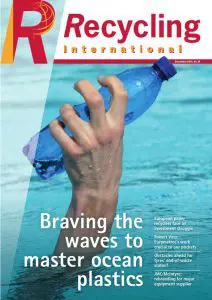Page 47 from: December 2014

Paper Textiles
December 2014
Bel Fibres SA
Rue de Monte en Peine 2
7022 HYON
Belgium
Phone (+32) 65.760.960
Fax (+32) 65.760.965
E-mail [email protected]
www.belfibres.be
Experienced specialists in
Collecting and recycling of
• Paper
• Board
• Plastics
• Archives destruction
advertisement
increase their buying to avoid becoming
short on inventory at the year’s end.
There have been some delays in trans-
porting material by truck from the USA
into Mexico, including sorted office
paper. Demand for other grades in
Mexico is lower, and downtime at Kim-
berly Clark mills is resulting in reduced
inventories for end-of-year tax audits.
Asia
Market falls asleep
Many transactions were sealed with the
Far East in early November but then the
market fell asleep. Very few orders have
since been lodged by most countries in
the region, including China. This weak-
er demand pattern caused prices for the
brown grades to drop by around US$ 10
per tonne over the course of the year’s
penultimate month. Whereas India had
been purchasing very healthy volumes
throughout the year, its buyers also
backed away from the market in
November owing to a combination of
sufficient stock and of falling prices.
Indeed, hardly any import orders were
placed by India over the period.
As for the immediate outlook, the con-
sensus is that not much will change in
December. Most mills in Asia have
either completed their buying require-
ments or are still playing a waiting
game in the hope that the market will
decline further. Packers in Europe, how-
ever, are not running with large inven-
tories such that a further drop-off in
values would prompt many of them to
build stock in anticipation of greater
rewards in January.
The general belief is that ocean freight
rates will remain the same for Decem-
ber.
Relaunch for charity shop grade
spec in the UK
The UK’s Textile Recycling Association (TRA) has relaunched its
specification for clothing donated originally by the public to
charity shops which is then sold on to TRA members rather than
being retailed in store.
First launched in 2002, the specification has been published
annually and was widely upheld for a number of years. During
recent years, however, it proved ever more difficult to uphold the
standard as growing numbers of ‘opportunist’ collectors were
prepared to pay ‘over-inflated prices’ for ‘increasingly poor-
quality clothing’, according to the TRA. But now ‘the bubble has
burst in the UK used clothing industry’, with values dropping
around 40% since the beginning of the year, established used
clothing collectors have become increasingly selective about what
items they are prepared to take from charity shops and how they
should be presented.
The review and relaunch of the Charity Shop Grade specification
should provide greater clarity for staff at charity shops to help
them ensure they obtain best value for their goods, the organisa-
tion believes.
‘Throughout 2014, very difficult market conditions have made it
necessary for used clothing collectors to reduce the prices that they
can pay charity shops and be more selective about the items they
take,’ observes TRA director Alan Wheeler. ‘They can no longer pay
high prices for low-quality items. If charity shops follow the revised
specifications, this should help them to negotiate favourable terms
and ensure that they get a price that is commensurate with the
market prices quoted by recycling trade press publications.’
The TRA is also calling on those charities still paying by the bag to
put an end to the practice and, instead, to ‘negotiate a price per kilo
for all their used clothing’.
Contributing to the
Recovered Paper Market
Analysis:
• Melvin de Groot (Van Gelder
Recycling, the Netherlands)
• Mariëlle Gommans (Bel Fibres,
Belgium)
• Joel Litman (Texas Recycling/
Surplus Inc, USA)
RI-10 Analysis Paper&Textiles.indd 47 04-12-14 14:39



